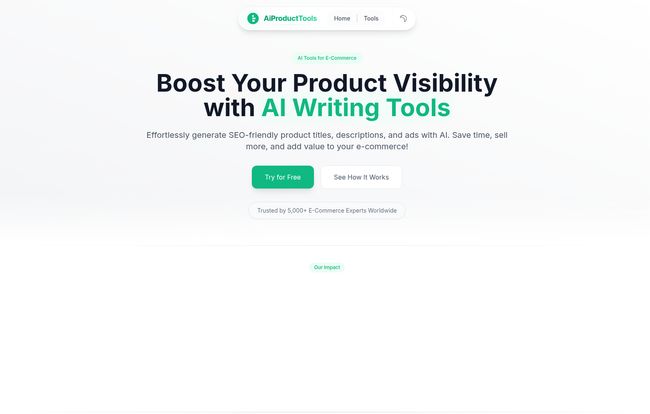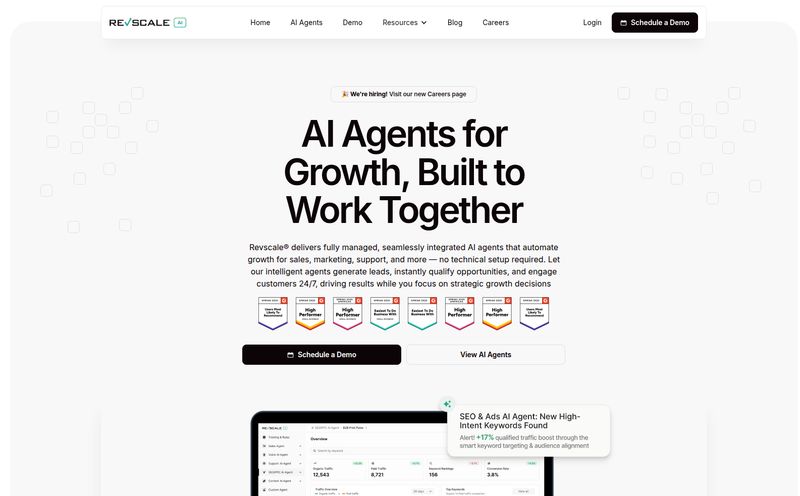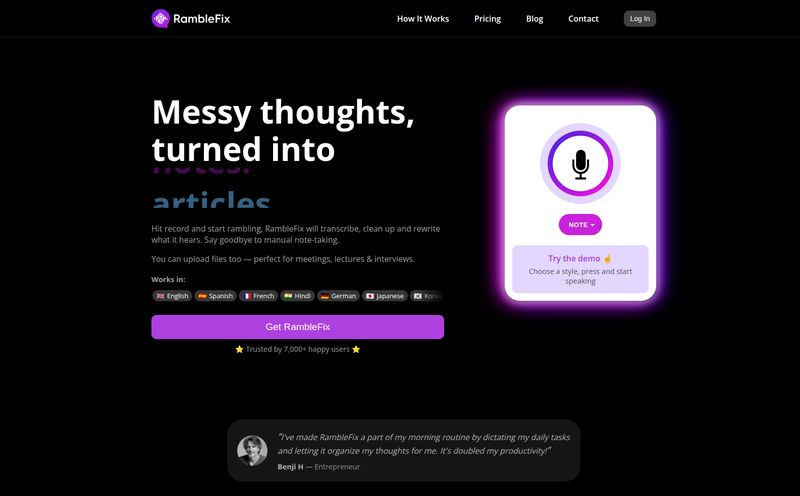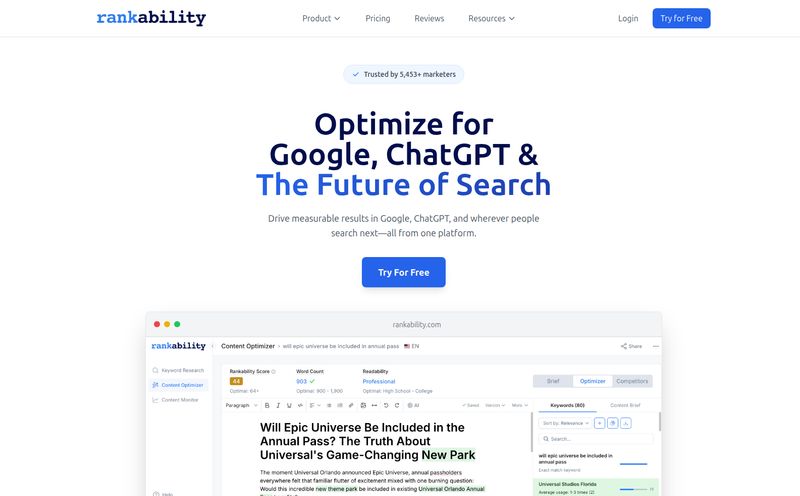If you've ever run an e-commerce store, you know the feeling. The one that sets in around the 78th product description you’ve had to write that day. Your eyes glaze over. The words start blurring together. "High-quality material," you type for the eleventh time, a single tear rolling down your cheek. The creative well is dry, and you still have 200 more SKUs to go.
We’ve all been there. It’s the content creation grind that can suck the life out of even the most passionate online seller. For years, we’ve been hearing the whispers, then the shouts, about AI coming to the rescue. I’ve seen my fair share of AI writers, and frankly, many of them feel like they just spit out that same generic "high-quality material" line, but with more synonyms.
So when a platform like AI Product Tools comes across my desk, claiming to be the AI solution for e-commerce, my professional skepticism kicks in. But so does my curiosity. Could this be the one? The tool that actually understands the difference between a product feature and a customer benefit? I had to find out.
So, What Exactly is AI Product Tools?
At its core, AI Product Tools is a suite of artificial intelligence writers designed specifically for the chaos of e-commerce. Think of it less as a single-purpose tool and more like a Swiss Army knife for your product pages. It’s not just about writing descriptions; it’s about generating everything from the perfect, clickable title to the nitty-gritty product specifications and even promotional ad copy.

Visit AI Product Tools
The whole idea is to take that mountain of writing tasks off your plate, freeing you up to, you know, actually run your business. The platform says it's trusted by over 6,000 businesses, which is a pretty solid number. They're clearly aiming to be a one-stop-shop for product-related content, and from the looks of it, they’ve thrown the entire kitchen sink at the problem.
The Sheer Breadth of Features is... A Lot
And I mean that in the best way possible. When I first saw the list of generators, I had to scroll a bit. It’s not just one or two tools; it's a full-blown content arsenal. I find it helpful to break them down into a few categories.
The Core Content Generators
This is your bread and butter. The foundational stuff that every single product page needs to even stand a chance in Google's search results. We're talking about the Product Title Generator, Product Description Generator, and Product Keyword Generator. These are table stakes for any tool like this, but getting them right is what separates the good from the useless. A good title gets the click, a good description makes the sale, and the right keywords get you seen in the first place. AI Product Tools also has a Product Feature Extractor, which is a neat little addition for quickly turning a boring spec sheet into digestible bullet points.
Beyond the Basics: The Conversion Crew
Okay, so you’ve got your SEO-friendly listing. Now what? You need to persuade people. This is where the next set of tools comes in, and for me, this is where things get interesting. The platform includes a Benefit Extractor, Headline Generator, Ad Generator, and even a Product Email Generator. This shows a deeper understanding of the sales funnel. It's not just about getting traffic; it's about converting that traffic into paying customers. Crafting a compelling ad or a promotional email can be just as time-consuming as writing a description, so having an AI partner for that is a huge plus.
The "Wait, It Does That Too?" Tools
This is the part that genuinely surprised me. There are generators for things I wouldn't have even thought to ask for. A Product Review Generator? A Product FAQ Generator? These are brilliant for adding social proof and tackling customer questions preemptively, which can seriously reduce support tickets and build trust. Then there's a Product Category Classifier and a Product Teaser Generator. It’s a comprehensive set of tools that covers almost every conceivable text-based need for a product page. I can practically hear the collective sigh of relief from dropshippers everywhere.
Putting It to the Test: The Good, The Bad, and The AI
A long list of features is great, but how does it actually perform? Like any tool, it has its high points and a few things to keep in mind.
Where AI Product Tools Really Shines
The most obvious win here is speed. The time-saving aspect can’t be overstated. I once worked with a client who had a catalog of over 3,000 products, most with awful, one-line descriptions. A project like that would take a human writer weeks, maybe months. A tool like this could slash that time down to days. The homepage even has a testimonial from a user who saw their conversion rates increase by 43% and their sales grow significantly. Now, your own mileage may vary, but that’s a powerful testament to what optimized listings can do.
From an SEO perspective, this is where the potential gets me excited. By systematically creating well-structured, keyword-rich titles and descriptions across your entire catalog, you are sending massive positive signals to search engines. Consistency is something Google loves, and this tool helps you achieve it at scale.
A Few Words of Caution
Now for some real talk. This isn't a magic button that prints money. It’s a tool, and it requires a smart operator. The biggest pitfall I see people falling into with AI is forgetting the final, human touch. The content it generates is a fantastic starting point, an amazing first draft. But you must go back and fine-tune it to match your brand's unique voice. If you're a quirky, fun-loving brand, you don’t want your product pages to sound like they were written by a robot in a boardroom. You have to inject your personality back into it.
This also ties into the idea that AI can reduce creative input. I’d argue it changes the nature of the creative input. Instead of staring at a blank page, your job becomes that of an editor, a refiner. You're no longer the bricklayer; you're the architect, ensuring everything fits the master plan. And remember the old saying: garbage in, garbage out. The quality of the product information you provide the tool will directly impact the quality of the output.
The Million-Dollar Question: What's the Price?
So, what’s the damage to your wallet? Well, here’s where things get a bit mysterious. As of this writing, I couldn’t find a public pricing page on their website. In fact, the most common links that usually lead to pricing plans gave me a “404 Page Not Found” error. Uh oh.
This could mean a few things. Maybe they’re so new they haven't finalized their pricing structure. Perhaps they operate on a custom-quote basis for larger businesses. Or maybe it was just a temporary glitch. Whatever the reason, it's a bit of an inconvenience. I'm hoping they get that sorted out soon because transparency in pricing is a huge factor for small to medium-sized businesses looking to adopt a new tool. For now, you’ll have to reach out to them directly to get the details.
Who is This Tool Actually For?
So, who should be rushing to check this out?
- E-commerce Store Owners with Large Catalogs: If you have hundreds or thousands of SKUs, this tool could be a lifesaver.
- Dropshippers and Arbitrage Sellers: People who are constantly adding new products need to generate listings quickly. This is tailor-made for that model.
- Digital Marketing Agencies: For any agency managing e-commerce clients, this is a powerful tool to have in your stack for scaling content production.
Who might not need it? If you're an artisan selling 15 unique, handcrafted items, you probably enjoy writing every word yourself, and you should! This tool is built for scale, not necessarily for the deeply personal, small-batch seller.
My Final Verdict
After looking at everything AI Product Tools has to offer, I'm genuinely impressed with its scope. It’s one of the most comprehensive e-commerce-specific AI writing platforms I’ve seen. It’s not just a description writer; it's a full-funnel content assistant.
The key is to view it as a powerful collaborator, not a replacement for human creativity. Use it to obliterate writer's block, generate solid first drafts, and ensure your SEO foundations are solid across your entire site. Then, come in with your human expertise and polish that content until it shines with your brand’s unique personality.
Despite the mysterious pricing situation, it’s definitly worth a look if you’re feeling the pain of the e-commerce content grind. Go in with your eyes open and your brand guide handy, and you might just find the shortcut you’ve been looking for.
Frequently Asked Questions (FAQ)
What is AI Product Tools?
AI Product Tools is an online platform that provides a wide array of AI-powered generators to create content specifically for e-commerce websites. This includes product titles, descriptions, keywords, ad copy, FAQs, and more, all designed to improve product visibility and increase sales.
Can AI Product Tools write SEO-friendly content?
Yes, absolutely. A core function of the platform is to generate SEO-optimized content. The Product Title, Description, and Keyword generators are specifically built to help your products rank better in search engine results by incorporating relevant terms and structuring the content effectively.
Is the content generated by AI Product Tools unique?
The content is generated by an AI based on the inputs you provide, so it creates new combinations of text each time. However, to ensure it's 100% unique and perfectly aligned with your brand, it's always best practice to review and tweak the output before publishing.
Do I still need to edit the AI-generated content?
I would strongly suggest it. While the AI can produce high-quality drafts, the best results come from using it as a starting point. A final human edit is essential to inject your brand's voice, verify facts, and add that creative flair that makes your products stand out.
How much does AI Product Tools cost?
Currently, there is no public pricing information available on their website. You will likely need to contact the company directly through their homepage to get details on plans and pricing.
What kind of e-commerce businesses benefit most from this tool?
Businesses with large product catalogs, such as large retail stores, dropshippers, or any e-commerce site looking to scale its content production efficiently, will see the most immediate benefit from a tool like this.



